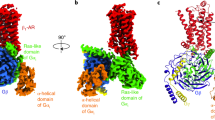Play all audios:

ABSTRACT Regulation of cellular response to external stimuli, hormones and neurotransmitters, is an important mechanism for controlling cellular functions. The transmembrane signaling of the
hormone receptors is regulated by GTP-binding proteins and their associated proteins. A new class of GTP-binding protein, Gαh is a bifunctional enzyme possessing two biological functions,
namely GTPase and transglutaminase (TGase) activity. This bifunctional Gαh mediates the α1B-adrenoceptor signal to an 85- kDa phospholipase C-δ1 (PLC-δ1) and associates with a -50 kDa
protein (Gβh) which regulates the the GTP/GDP binding affinity of Gαh. Gh, the holoenzyme is thus a heterodimer, and the subunits dissociate from each other upon activation with GTP or its
analogues. The GTPase and TGase activities of Gαh are regulated by two reciprocal activators, Ca2+ and GTP. The GTP-binding subunit, Gαh directly interacts with the α1B-adrenoceptor and
stimulates PLC-δ1. Gβh, however, neither interacts with the receptor nor stimulates PLC-δ1. Therefore, Gβh functions as a counterpart to the receptor for the activation of Gαh. SIMILAR
CONTENT BEING VIEWED BY OTHERS STRUCTURAL BASIS AND MECHANISM OF ACTIVATION OF TWO DIFFERENT FAMILIES OF G PROTEINS BY THE SAME GPCR Article 10 November 2021 MECHANISTIC INSIGHTS INTO
G-PROTEIN COUPLING WITH AN AGONIST-BOUND G-PROTEIN-COUPLED RECEPTOR Article 12 June 2024 STRUCTURES OF Β1-ADRENERGIC RECEPTOR IN COMPLEX WITH GS AND LIGANDS OF DIFFERENT EFFICACIES Article
Open access 14 July 2022 ARTICLE PDF AUTHOR INFORMATION AUTHORS AND AFFILIATIONS * Department of Molecular Cardiology, Research Institute, The Cleveland Clinic Foundation, Cleveland, Ohio,
44195, U.S.A. Mie-Jae Im Authors * Mie-Jae Im View author publications You can also search for this author inPubMed Google Scholar RIGHTS AND PERMISSIONS This is an Open Access article
distributed under the terms of the Creative Commons Attribution Non-Commercial License (http://creativecommons.org/licenses/by-nc/3.0/) which permits unrestricted non-commercial use,
distribution, and reproduction in any medium, provided the original work is properly cited. Reprints and permissions ABOUT THIS ARTICLE CITE THIS ARTICLE Im, MJ. Biological functions of the
unusual guanine nucleotide-binding protein Gαh: transglutaminase II. _Exp Mol Med_ 28, 109–117 (1996). https://doi.org/10.1038/emm.1996.17 Download citation * Published: 01 September 1996 *
Issue Date: 01 September 1996 * DOI: https://doi.org/10.1038/emm.1996.17 SHARE THIS ARTICLE Anyone you share the following link with will be able to read this content: Get shareable link
Sorry, a shareable link is not currently available for this article. Copy to clipboard Provided by the Springer Nature SharedIt content-sharing initiative
